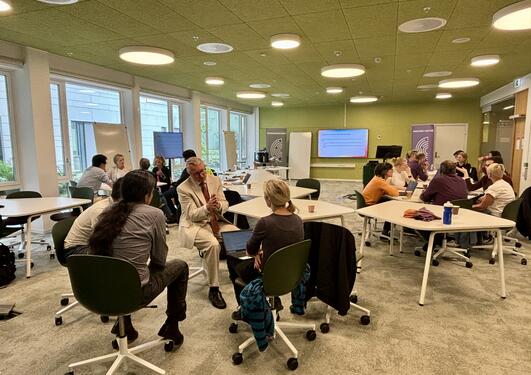
The thematic area SAMLET works with teaching and research within the areas of public health, occupational and environmental medicine and health management, both nationally and internationally.
Research
At SAMLET, our researchers work in many different research groups broadly affiliated with the institute.
Occupational and Environmental Medicine focuses on work- and environment-related exposures and their impact on health. The group's vision is to create healthy workplaces and a healthy external environment, both nationally and globally.
HELTER is a research group in health economics, management, and translational ethics research, and it falls under the ETØK area of expertise. Their vision is to provide multifaceted knowledge and solutions to the challenges faced by the healthcare system.
Repro-Epi is a research group focusing on the epidemiological monitoring of perinatal health issues and evaluating the health services provided in connection with childbirth. Central to their research is the Medical Birth Registry. This research group is part of the EPISTAT area of expertise.
LERG is a research group in lifestyle epidemiology that focuses on epidemiological studies of disease causes, particularly lifestyle factors and other environmental factors. LERG is one of three research groups in the EPISTAT area of expertise.
The Pandemic Center is an interdisciplinary center located at SAMLET. Through research, education, and dissemination, it aims to provide innovative knowledge that enables society to handle pandemics as effectively as possible.
Teaching
SAMLET, as an area of expertise, has a significant responsibility for teaching. The teaching group is responsible for Social Medicine at the Faculty of Medicine. Our educators engage with students throughout the medical curriculum as community medicine at the university encompasses a variety of fields:
Social medicine, social inequality, and prioritization of health services and offerings (1st semester)
Preventive medicine and health law (3rd semester)
Environmental medicine (4th semester)
Community medicine, health systems, and collaboration (6th semester)
Occupational medicine and preventive medicine (10th semester)
Social security medicine and community medicine (11th semester)
Medical history (1st – 12th semester)
Adjacent fields such as health management, health economics, quality development, health policy, and international health (1st – 12th semester)
We also contribute to various other teaching offerings at the institute and faculty, including the Master’s program in Health and Society as well as the Master’s program in Global Health.
Dissemination
The field contributes consistently to various international and national journals, but here we have provided links to particularly useful national resources (all in Norwegian):
Michael – publication series for the Norwegian Medical Society https://www.michaeljournal.no/
Ramazzini – Norwegian journal for occupational and environmental medicine
Utposten – professional journal for general and community medicine https://www.utposten.no/
E-book in occupational medicine
Yrkeshygienikeren – the membership journal of the Norwegian Occupational Hygiene Association.



